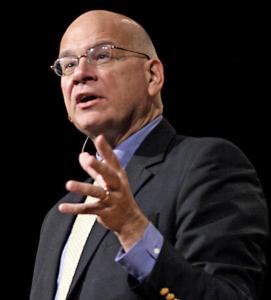This is a Guest Post by my friend and colleague Logan Zeppieri. Logan holds an MA in Philosophy from Talbot School of Theology, a BA in Philosophy of Science and is a current graduate student in Clinical Psychology. His work includes political and business research, pastoral training, animation, and essay contributions to several publications like the Claremont Institutes, “The American Mind.”

Recently, pastor and theologian Tim Keller has ventured into the twitter-verse to make a new name for himself as the arbiter and sooth-sayer of Evangelical political engagement. Through hope-filled attempts at rational discourse, he has tried to balance his personal dissatisfaction with the conservative Evangelical voting bloc while deftly avoiding the relentless barrage of blame from progressive Evangelical elites and their ever-watchful eye under which his New York City church has flourished. However, this past week, Keller’s remarks on Twitter about the theological contradictions of politically-engaged, conservative Evangelical churches should make one wonder if he has finally lost his mind.
Keller writes in his first tweet,
Here are two Biblical MORAL norms: 1) It is a sin to worship idols or any God other than the true God & 2) do not murder. If you ask evangelicals if we should be forbidden by law to worship any other God than the God of the Bible—they’d say ‘no.’
He continues this thought in his second tweet,
We allow that terrible sin to be legal. But if you ask them if Americans should be forbidden by law to abort a baby, they’d say ‘yes.’ Now why make the first sin legal and NEVER talk about it and the second sin illegal and a main moral/political talking point?
In George Orwell’s 1984, there is an oft-quoted line, “The party told you to reject the evidence of your eyes and ears. It was their final, most essential command.” The problem in modern political discourse is we have often emphasized the wrong end of that thought—Orwell is less concerned with party politics and party power than with the supreme authority by which the party’s propaganda has convinced the world to deny their own good senses. G.K. Chesterton makes a similar case in his book, Orthodoxy,
The mystic allows one thing to be mysterious, and everything else becomes lucid. The determinist makes the theory of causation quite clear, and then finds that he cannot say “if you please” to the housemaid. The Christian permits free will to remain a sacred mystery; but because of this his relations with the housemaid become of a sparkling and crystal clearness.
The practical objection to Keller’s theory of the world is that his theory seems to prevent him from seeing the practical effects of the world. Is there no practical difference between the woman who idolizes her own dress and the woman who deprives her own child of life? Is there no difference between the man who extinguishes his love for God and the man who persuades a woman to extinguish their child?
Of course there is.
But, for Keller, the problem is not merely in denying practical sense, he is also wrong in theory. If a man’s worship of money leads him to commit fraud or theft, he is guilty before our law. If a man’s worship of Baal leads him to sacrifice his child by fire, he is guilty before our law—even to the point of his own death by capital punishment. The line has been drawn, very clearly and for a very long time, between one’s relationship with God, by which God alone may judge our conscience, and one’s relationship to society, by which our actions may be judged as a tree is judged for bearing good or bad fruit. When distinguishing between one’s worship of false idols and one’s choice for abortion, that principle can be applied, and applied clearly and consistently.
Keller continues in his third tweet,
At the very least, it shows a lack of knowing how to apply the Bible to politics. Since we can’t simply say, “If the Bible says its sin it should be illegal”-how do we choose which morals to politically champion? Please don’t say, “I just want to see the 10
He continues in his fourth tweet,
…commandments made law in society.” That’s too simplistic and we don’t do this already. The Bible tells us that idolatry, abortion, and ignoring the the poor are all grievous sins. But it doesn’t tell us exactly HOW we are to apply these norms to a pluralistic democracy.
Chesterton once addressed this sort of “paralyzing pietism” when he wrote,
The old humility was a spur that prevented a man from stopping; not a nail in his boot that prevented him from going on. For the old humility made a man doubtful about his efforts, which might make him work harder. But the new humility makes a man doubtful about his aims, which will make him stop working altogether.
Keller’s argument begins with “How do we distinguish which sins should be legal and which sins should not” and then concludes, “So, how could we possibly decide?” He has taken the complexity of the world as an excuse to refrain from seeking a solution, instead of taking the complexity of the world as an excuse to double our efforts in hopes to provide one.
As Keller continues in his sixth through tenth tweets,
We are to help the poor, but the Bible doesn’t tell us which political strategy (high taxes and government services vs low taxes and private charity) to use. The Bible binds my conscience to love the immigrant-but it doesn’t tell me HOW many legal immigrants to admit to the U.S.
…every year. I know abortion is a sin, but the Bible doesn’t tell me the best political policy to decrease or end abortion in this country, nor which political or legal policies are most effective to that end.
The current political parties will say that their policy most aligns morally with the Bible, but we are allowed to debate that and so our churches should not have disunity over debatable political differences! It is also why I have never publically[sic] or privately told Christians who they should vote for. I have also never told anyone they
should vote Democrat or Republican. Depending on the policy we can find more or less alignment with Biblical morals. I believe all Christians should be active in politics, but it is unwise to identify Christianity with any particular party. For more see:
Sigh. People are focusing on the example (abortion is physical harm) and not the principle. You can do the same object lesson about gay marriage…why codify that moral in law and not others?
I [Logan] would be hard-pressed to be convinced that Keller would take the same line of argument he has taken on abortion, if it was concerning slavery. If one party was for slavery and one party was for its abolition, would Keller argue that it’s just a matter of difficulty to know which to support or which policy to pursue? Would he consider slavery or murder not morally significant issues which ought to divide the church?
Instead of comparing a moral dilemma concerning infringments against the image of God (namely, slavery) with another moral dilemma concerning infringments against the image of God (namely, abortion), Keller has taken a permutation of a familiar argument that atheists have made against Christianity—treating all sins as equal and comparing an atrocity to an infringement, or what can be judged by man to that which can only be known by God. But, then again, I suppose such heinous acts against an image of God are much too complex for such a simple guiding principle as this: thou shalt not murder.
However, there is one critique I believe falls squarely on the Evangelical academic elite. In the television series Rick and Morty, there is an episode which runs more like a parody of W.W. Jacob’s book Monkey’s Paw than Ray Bradbury’s Something Wicked this Way Comes. The episode features the Devil opening a trinket shop, selling trinkets which grant the wishes of his customers with disturbing side-effects. Over the course of the episode, Rick confronts Summer, his grand-daughter, several times over working at the Devil’s trinket shop. This leads Rick to open his own “de-trinket” shop next door, dedicated to exposing the Devil as a fraud. In the final confrontation, Rick, upset by the arrangement, tells Summer she’s “work[ing] for the Devil”. Summer responds, “At least the Devil has a job. At least he’s active in the community.”
The Evangelical academic elite, for all their libraries and bookshelves and impressive publication records, have widely failed to fulfill the oaths of their post. Our culture is in the midst of momentous and widespread political turmoil, and when the church petitions her academic elites they are answered with long-winded, spectacularly worded “I-don’t-know-it’s-complicated” shoulder-shrugging. And worse yet, as Keller illustrates, they often land on comments which grossly violate the distinction between how one may desecrate their conscience and how one may take the life of the innocent.
To be fair: we know it’s complicated; we know it’s hard; we know that voicing a conviction is unpopular. However, what we need is a positive and firm vision of the modern church. We need someone to hold to the the foundations of a clearly enunciated, unapologetically affirmed, and unashamedly contended gospel of Christ—in all of its doctrines, especially those concerning the Image of God in man. And that is where Keller’s comments fall short–very short. His comparisons assume that there is fundamentally little, if any, value in the destruction of an image bearer of God.
Therefore, in response, I’ll start. The church has always believed that abortion is not merely a grave sin, but that abortion is murder—it is killing an innocent image bearer of God. And we should, as Christians, pursue every possible avenue to lessen or prohibit it. But even more than that, we should compel people to understand why it must be prohibited and why no provision should be made for it. That is our job as the Church, our role as the culture’s prophetic voice.
For some, this will mean enacting public policy; for others, it will mean speaking-out on whatever platform you may have; still more, it may mean spending a late night talking to your friend who thinks abortion is the only way out. Even more, it may mean giving a few dollars to help a crisis center; and, again, still even still more, it may simply mean praying for God to help those who can lessen or prohibit abortion. As illustrated by the Parable of the Good Samaritan, we must help our neighbor—the ones needing help within our arms reach.
If the evangelical elite cannot add or modify this statement on abortion, then we must question the purpose of the academic elite—for they’re not even active in the community.
Featured Image: Frank Licorice, CC BY-SA 2.0 <https://creativecommons.org/licenses/by-sa/2.0>, via Wikimedia Commons













